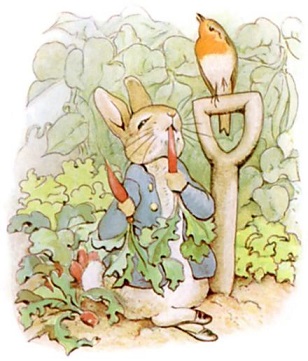
Courtesy of wikipedia.com
While my mother’s death feels like blisters under my skin; while there are riots in the streets– a reaction to police brutality; and while the pandemic continues to rage, killing over 100,000 people in the United States, I’ve spent my evenings without the news and chosen to feed my inner child. Before going to bed, I want my head stuffed with images that would delight a six-year-old. Last evening, for example, I watched the gentle adventures of Beatrix Potter’s creations: Peter Rabbit, Mr. Tod, and Mrs. Tiggy-Winkle. The previous night, A Cat in Paris held my attention.
Bad things happen in children’s stories, certainly. Peter Rabbit has to be wary of Mr. McGregor. The Paris cat has narrow escapes with its friend… a cat burglar. Even so, by the time I’ve clicked off the remote, all my imaginary friends are home safely in their beds. Safe. That’s how I want to feel in times of distress. Threatening shadows must all disappear, which is why I am indebted to storytellers and to the industry that brings these magical characters to life.
Today seems an appropriate time to tip my hat to the entertainment world. Thank you for making it possible for me to escape to a safe place for an hour or two each evening.
Even so, I worry about the future. With society hungry for distraction, can this enchanted industry survive while it’s in lockdown? (“Quiet On Set,” by Joy Press, Vanity Fair, June 2020, pgs. 117-121.)
Already, the virus has put an end to sound stages that once were robust with actors, directors, and technical crews. Those who can work at home, like writers, do. But what is the fate of camera crews and technical specialists, or even the gofer who brings coffee to the set? Hands-on work can’t be done virtually. I refer to the gig economy, jobs filled by the day, week, or month. When production shuts down these people lose their jobs.
Most of us see show-biz as a glamorous affair, frothy with hefty salaries. That’s true for those at the top of the food chain, but not for behind-the-scene workers. They live from job to job.
A few organizations exist to help these folks in times of crisis, but if the industry fixes on a permanent workaround, one that can withstand another pandemic, productions of the future may require fewer workers.
While no one can predict what the post quarantine world will look like, change is certain. During the adjustment, people will be hurt. I can only hope our mutual suffering will give rise to mutual compassion. Like Flopsy, Mopsy, and Cottontail, perhaps people will see the importance of looking after one another.
